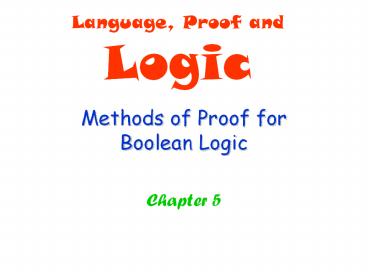Methods of Proof for Boolean Logic - PowerPoint PPT Presentation
Title:
Methods of Proof for Boolean Logic
Description:
From P, infer P Q (disjunction introduction) Proof by cases (disjunction elimination) ... To prove Q from a disjunction, prove it from each disjunct separately. ... – PowerPoint PPT presentation
Number of Views:225
Avg rating:3.0/5.0
Title: Methods of Proof for Boolean Logic
1
Methods of Proof for Boolean Logic
Language, Proof and Logic
Chapter 5
2
Beyond truth tables
5.0
- Why truth tables are not sufficient
- Exponential sizes
- Inapplicability beyond Boolean connectives
- Need proofs, whether formal or informal.
- For informal proofs, it is relevant who your
listener is. - This section talks about some informal proof
methods.
3
Valid inference steps in informal proofs
5.1
- In giving an informal proof from some premises,
if Q is already - known to be a logical consequence of some already
proven sentences, - then you may assert Q in your proof.
- 2. Each step should be significant and easily
understood (this is where - your audiences level becomes relevant).
- Valid patterns of inference that generally go
unmentioned - From P?Q, infer P (conjunction
elimination) - From P and Q, infer P?Q (conjunction
introduction) - From P, infer P?Q (disjunction
introduction)
4
Indirect proof (proof by contradiction)
5.2
Contradiction --- any claim that cannot possibly
be true. Proof of ?Q by contradiction assume Q
and derive a contradiction. Proving that ?2
is irrational Suppose ?2 is rational. So, ?2
a/b for some integers a,b. We may assume at
least one of a,b is odd, for otherwise divide
both a and b by their greatest common divisor.
From ?2a/b we find 2a2/b2. Hence a22b2. So,
a is even. So, a2 is divisible by 4. So, b2 is
even. So, b is even. Contradiction.
5
Proof by cases (disjunction elimination)
5.3
- To prove Q from a disjunction, prove it from each
disjunct separately. - There are irrational numbers b,c such that bc is
rational. - ?2?2 is either rational or irrational.
- If rational, then take bc ?2, already known to
be irrational. - If irrational, take b?2?2 and c ?2.
6
Arguments with inconsistent premises
5.4
Premises from which a contradiction follows are
said to be inconsistent. You can prove anything
from such premises! An argument with
inconsistent premises is always valid yet never
sound!































